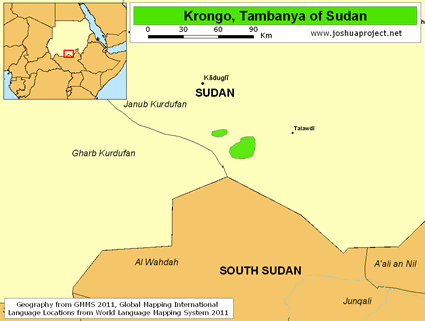The Nuba people claim to be the original inhabitants of the Nuba Mountains which are located in Sudan's South Kordofan Province. For centuries this area was also a refuge for various people fleeing oppressive governments and slave traders, creating a situation where there are nearly 100 different dialects. One of these is Krongo, spoken by the Krongo people. Although the people are collectively referred to as "Nuba," the term is used as a regional grouping for a people who share the same environment and stand out as distinct from the surrounding tribes. Because of the linguistic diversity in the Nuba Mountains, many speak Arabic as a trade language.
Because most of the Nuba tribes originally fled to the mountains for refuge, they generally dislike and distrust outsiders. While most of the tribes still live in the Nuba Mountains, some individuals have migrated to the surrounding hills and plains since the late 1800s. Others have even moved to towns and cities, either permanently or seasonally, in search of jobs or schools for their children. This gradual migration started during the days when this region was controlled by the British Empire. The British brought law and order and safety to the area, so tribes felt free to move about. The Krongo are hard-working farmers, and their livelihood is based primarily on agriculture. Sorghum, their staple crop, can either be sold or made into beer. They grow millet, sesame, peanuts, and tobacco for personal consumption. They also gather forest products and sell them as some of the region's exports. Even the women have small vegetable gardens in which they raise vegetables such as onions, okra, beans, and maize. The Krongo also keep cattle, sheep, goats, and chickens.
Millet porridge is a main part of the Krongo diet. They serve it with a sauce made from meat, okra, or kidney beans. Dura, a thin, coarse bread, was introduced to the area by the neighboring Arab groups. Today, it has become one of their staple foods. Dura can also be used to make a mild beer. The Krongo who have migrated into cities now enjoy eating bread from bakeries, fresh meat, and fresh produce, giving them less of a desire to eat simple porridge.
Individual communities vary in size. Some groups live in smaller villages with only a thousand inhabitants. Other groups have combined with the neighboring villages, forming much larger communities. A typical Krongo home is made of either stone or plaster-covered thatch. Each home has a kitchen, sleeping quarters, and a granary. Some houses also have special rooms where the young unmarried girls of the neighborhood sleep.
Village communities are organized by clans or extended family sections. The authority of the village is left in the hands of clan elders. Each community usually has a large, stone mosque. Most villages also have Islamic schools where boys and girls study the Koran. All boys are circumcised, and husbands are permitted to have as many as four wives in accordance with Islamic law.
The Krongo people are Muslim and allow Islamic law to shape their daily lives. The laws of Islam bind the Nuba peoples together in education, dress, diet, family life, and spiritual life. Devout Krongo families pray five times a day facing Mecca.
The Krongo and other peoples of the Nuba Mountains need the chance to hear the gospel and respond to the person, Jesus Christ.
Pray for an enormous harvest for the Krongo people, and that they will understand it as God's provision for their needs.
Pray for spiritual hunger that will lead Krongo leaders to seek and find the only Savior.
Pray for the Lord to thrust out steadfast workers to the Krongo and other peoples of the Nuba Mountains.
Pray for a Holy Spirit directed movement to Christ among the Krongo people, leading them to God's abundant blessings.
Scripture Prayers for the Krongo, Tabanya in Sudan.
| Profile Source: Joshua Project |











